- Home
- Studs Terkel
P.S. Page 15
P.S. Read online
Page 15
Many times I have gone in my house and taken my husband’s old shoes and his coat, and some of them, he needed them himself, but I didn’t feel he needed them as bad as that man needed them, because that man, to me, was in a worse shape than he was in. Regardless of whether it was Negro or white, I would give ’em to him.
[strains of “Hard Travelin’ ” playing]
SIDNEY WEINBERG: October twenty-ninth, nineteen hundred and twenty-nine [the day of the crash]. I was down all night long, and I think I stayed in the office a week without going home. The tape was running, I’ve forgotten how long at night. I think the New York Stock Exchange ticker tape—it was ten or eleven o’clock at night before we got the final reports of what was done.
Remember what the men were talking about, the people, their feelings?
SIDNEY WEINBERG: Well, by that time they were so stunned they were thinking anything. They didn’t know what it was all about. ’Cause it came out like a thunderclap out of the air.
You had general confusion all throughout the street, because they didn’t understand it any more than anybody else. They thought something would be announced. It got so serious that very prominent people were making statements. Like Mr. John D. Rockefeller Jr., who was making a statement on the steps, I think it was, of J. P. Morgan & Co., that he and his sons were buying common stocks, which . . . immediately the market went down again.
A lot of people were hurt. Why, people were literally jumping out the window. Franklin D. Roosevelt showed real leadership and courage. And we were on the verge of having the change of our whole system if he hadn’t done what he did.
FDR saved the system, in my opinion. You’d have had . . . The Depression would have been much deeper and it . . . it’s trite to say that the system would go out the window. Certainly a lot of the institutions of the system were changed anyway in the normal course of it. But it could be much worse. You could have had rebellion.
CLIFFORD BURKE: Listen, truthfully, the average Negro don’t know such a thing as Depression. Because from the day he was born, he was born in depression . . . so naturally, he don’t know no more than the word “depression.” As far as a job was concerned, the best he could get would be a job, like I say, driving team, or working in a coal yard, working in some factory. If he was in a factory, he was the janitor or the porter, which didn’t pay much. So you can understand very clearly why no such thing as the Depression really meant too much to him.
Then another thing, if you figure it up this way, the advantage that we had as Negroes was this: our wives and our mothers, they could go to the store and get a bag of beans, and maybe a bag of potatoes, and a big sack of flour, and a big piece of fat meat. And they could cook this up and we could eat it. You take the other fella—I’m referring now to the white fella. He couldn’t afford . . . he couldn’t do this . . . for the simple reason was this here: He’d always been in a position where he could get something good to eat. His wife would tell him, “Look if you can’t do better than this here, I’m gonna leave you.” I mean, this is real; I seen it happen, see. You take a fella had a job, say, paying him sixty dollars a week, and here I’m making twenty. Now, if I go home and take some beans or anything home to my wife, she’ll fix that, we’ll sit down, and we’ll eat it. It isn’t exactly what we want, but we’ll eat it. But this white fella that’s been making this big money, and he go bring this home, and his wife isn’t going to accept this. [Chuckles]
Why did these fellas—all these big wheels—why did they kill themselves? They weren’t able to really live up to the standards that they’d been living up to before. The American white man has been superior so long, until it’s just something that he can’t figure out why he should come back and come down . . . He can’t understand this. He couldn’t stand the idea of being defeated, see. And when I say defeated, he couldn’t stand the idea of having to go on relief like the Negro had to go. He couldn’t stand to think that he had to work for a small salary, and as I said before, bring home the beans instead of bringing home a steak.
I can remember very distinctly a friend of mine who just before the Depression was pretty well set. And by them not knowing that he was a Negro, he got tied up downtown in stocks . . . and he came back home and drank poison and it killed him. I think he had about twenty thousand dollars that he blew in the stock market. It was a rarity, though, to hear tell of a Negro killing himself over a financial situation. Well, I can understand very clearly why he didn’t do it, because there were so few that had anything that had to do it, see. [Laughs]
JOE MORRISON: We was used to rough times . . . always. I went to Detroit and worked a little while. I got fired for . . . over a grievance in ’thirty-four. Well, I got a couple of jobs, but they had me blacklisted, and I didn’t get anything . . . [Small laugh] I never got a job again until I went to work in the steel mill in ’thirty-six. And these people here that are getting pretty fair wages wouldn’t be . . . again, and if somebody hadn’t put up a fight for it a long time ago. That’s the thing about it that’s forgotten. The difference I see is that there’s fewer of them educated on . . . on labor.
For as far back as I can remember, up until since the end of World War II, you always found a bunch of young workers, up and coming, that read a lot and kept up with the times. And they could . . . they liked to discuss history and things like that. The people has forgotten a lot. They just . . . the young generation has just simply forgotten, and the history of these periods back of us is just being covered up.
EVELYN FINN: I find a human being forgets very easy. They flare up very easy, and they forget very easy. If they get a little prosperity, they don’t know—they don’t know nothing about what’s in the past. Even I think with wars and everything . . . they forget. They even forget when they lose somebody in the war. I don’t think it affects them too much.
I went and worked in New Orleans a year . . . it was in’thirty-three, the summer of ’thirty-three. And there had been a union there, but it didn’t mean nothing. You know how unions get there. . . . They didn’t do anything, either. So we went to work, and there was a couple more girls, and so we went up to the council, the union council, to try to get help to organize the women workers in these shops making men’s clothing. And I even got up to the councilmen one day, and they kept hee-hawing and you know, trying to . . . Thought we were women that didn’t know what we were doing. And so I got up one night, one day, and I said, “Well, listen, I want to see one man in here that’s got a union label in his clothes.” And that made ’em mad. We got fired. [Chuckles] And the wages they were working for . . . Well, that’s where I got the experience of my life. But in Saint Louis, before there was a union, I took out shops! Oh, yes, I’d take ’em out.
When you took out shops, how do you mean?
EVELYN FINN: They got a union.
How would you do that?
EVELYN FINN: Well, you just organize your workers. You first have to get ’em on your side, you know. And then you challenge the boss! The girls used to come in, in the morning, and they’d be tired. I said, “Well, I come in to fight today. Don’t make no difference to me whether I work or not.” [Laughs]
[Strains of “Roll the Union On” playing, followed by strains of “The Farmer Is the Man”]
OSCAR HELINE: After he’d lived all his life on a given farm, he lost it. It was taken away from him . . . just one after the other. And it got so that the farmers couldn’t stand it anymore. They had seen their neighbors sold out.
Now, during this period of time, we’d had lots of trouble on the highway. Some people were so determined that they could correct this by withholding produce from the market, particularly in northwest Iowa. We had farmers who would organize themselves, and they would man the highways. And those who would want to sell produce would be stopped, and the produce dumped on the highway. Cream cans were emptied in the ditches, and eggs were dumped on the highways. Normally they would never react like this except in desperation. And those of us who had been
brought up as conservatives, which most of us were, didn’t find it easy to go out and do these things.
Right at that time was being burned—it was cheaper than coal—corn was being burned. We burned a little here. We didn’t like to, but it was cheaper than coal. You couldn’t haul it to town and trade it for coal. In other words, we burned it, and you might as well let it lay because it wouldn’t pay any bills. You couldn’t hardly buy groceries with a ten-cent corn. It would hardly pay for the transportation, you see. We had situations out in South Dakota where the price listed in the country elevator was minus three cents. If you wanted to sell them a bushel of corn, you also had to bring in three cents a bushel in cash . . . or they couldn’t afford to take it. They couldn’t pay the transportation and handling.
So you see how desperate this thing is. And then when the federal government came out with these funds . . . That was the hope; that was the new hope; that was the real hope.
The real boost came when we got into the Second World War. And the beginnings of it, of course, created hope. I had a neighbor over here during this period when we were just getting out of the Depression and prices weren’t very good. And we had a boy that was ready to go to service . . . and one day he told me that what we needed in this country was a damn good war. And I said yes, but I hate to pay with the price of my son. Which we did . . . [A long pause; he chokes up]
[Softly] Oh, God.
OSCAR HELINE: It’s too much to pay . . . and I think we’re too smart a people to let that happen again. I don’t think we have to go to war to have prosperity . . .
EMIL LORIKS: Five hundred farmers came marching up Capitol Hill one day. It just thrilled me. I didn’t know that farmers were intelligent enough to organize to come to our state capital here in Marston . . . Capitol Hill. Well, it signified a lot of strength that I didn’t realize we had. The potential there for action. And so this kept going and I just . . . And the day after the farmers left, a senator from Lake County, the adjoining county, got up and attacked ’em. He said they were a radical bunch of—he called them anarchists and Bolsheviks and so on, he said. [Laughs] And there was a banner, he said, that was redder than anything in Moscow, Russia. And I thought, what was that banner? It was a piece of muslin hung up in the auditorium that says: “We Buy Together, We Sell Together, We Hold Together.”
The Holiday Association was organized as an emergency organization in thirty-one. Its purpose was to withhold farm products from the market for cost of production. We were hoping to get legislation that would ensure cost of production. And this took hold . . . It spread like a prairie fire. It crossed the border into South Dakota. There was a spirit of militancy. The slogan was—this was the slogan I heard: “Neither Buy nor Sell, and Let the Taxes Go to Hell.” [Chuckles]
First sale, or real dramatic one, was at Millbank, South Dakota. They moved in to sell a farmer out, and the Holiday boys moved in, in force . . . and they bid the stuff in for a nickel or a dime. If somebody really started to bid that wanted to buy something, they’d just elbow ’em out, says, “You don’t know . . . You get out; you move out of here. Move aside.” And at Millbank they had the sheriff and about sixteen deputies there. And one of them got a little trigger happy, which was a mistake, and the boys disarmed him so fast, they didn’t know what happened. They just yanked their belt; they didn’t even unbuckle them. They took their guns away from them. And a leader up there by the name of Oscar Brekke got up and made quite a speech. We called him the Patrick Henry of the movement. And he made a speech deploring violence. And he deplored the fact that the sheriff and his deputies came in there to a peaceful assembly and started this ruckus. He got up on a manure spreader and made this speech. [Chuckles] That dramatized this thing all over.
After that sale we didn’t have much trouble stopping sales. Farmers would crowd into the courthouse, probably five, six hundred . . . and it made it impossible for the officers to carry out the sales. [Chuckles] They tell me of an incident on [Highway] 75, they were coming in there, and one lone farmer come out of the woods, and he had big planks across the road . . . and they ordered him to move those planks, you know. He said, “I’m not. . . . You’re not going through.” Well, they came out there with their guns and pointed at him, and he said, “Go ahead and shoot, but there isn’t going to be a one of you SOBs get out of here alive.” [Chuckles] There was probably fifteen hundred farmers there in, around in the woods. So they didn’t get through.
It’s almost like the American Revolution in a way, isn’t it?
EMIL LORIKS: Yeah. It was so close to it . . . it was so close to it.
BUDDY BLANKENSHIP: I went to work in the mines. I was about fifteen or sixteen years old, and I had about fourteen miles to go to school. . . . I had to walk it. . . . And I told my dad, “I ain’t goin’ to school no more.” Well, he said, “If you don’t want to go to school, why, you just come on and go to work with me.” I went in the mines and went to work. We was on horseback all the way there. Many times, why, I’d be sitting behind my dad and get off and hammer his feet out of the stirrups . . . they’d be froze so tight in the stirrups. Well, we got up at five o’clock every morning. . . . We started work at five o’clock every morning. Had to be at the mines at six . . . and we got out at ten at night. That’s sixteen, seventeen hours. The boss said we had to clean it up. If we didn’t clean it up, there’d be another man in the place the next morning to clean it up. Just stay there till we did clean up.
BUDDY BLANKENSHIP: You had to get on your knees. Coal was slow. And I’ve traveled hard seven miles for the man, traveled back and forth, seven miles . . . on my knees. Well, I’ve had my knees to be swelled up to be . . . with big knots on ’em, big as double fists.
I liked the mines; I liked the mines, until I got so I couldn’t work in ’em. And I can’t get in ’em now, you see. Last I got in’em, when I worked in ’em, why they was . . . my wind was too short and there’s too much dead air . . . and I just choked up. I couldn’t do no good in ’em. I couldn’t work too long in ’em no more.
MARY OWSLEY: When he went to work in the coal mines, he worked for the Norton Coal Company at Nortonville, Kentucky. And he fired the boilers . . . and then he was a very good dynamite man. And then when the shift come out, he’d go down and chute down the coal. And he went to work one day and he noticed on the side of the boiler a place about as big as a saucer, where it was . . . they call it a breather. It’s a weak place on the boiler. And he come in that night and he says, “Well, I’ll go back to work Monday, but I may not stay; I may come back home.” Because he had told Mr. Ball that that had to be fixed . . . because he didn’t want to get killed. He had his family . . . he didn’t want to get killed.
So he went back to work then, Monday . . . went along. Then I saw him coming back home. They hadn’t fixed it. . . . They hadn’t done a thing about it. And he told ’em, he said, “In less than three weeks there’ll be an explosion.” And sure enough there was. Killed three men and two mine mules . . . from that very thing. But he left. But we had bought our furniture from the company store. We lived in a company house. . . . I had to buy every gallon of water I used. They undermined their employees so bad . . . they ruined all the water wells. And we didn’t live extravagant, either; believe me, we didn’t. But I’ve seen him have to borry from his next paycheck . . . what they call scrip . . . to buy just medicine and things like that . . . till the next payday. And we bought—we paid two hundred and . . . over two hundred dollars, two hundred and sixty-some-odd dollars for furniture from the coal mine company, and we paid it all back but twenty dollars. And when he went up and got a job around Greenville, Kentucky, near Central City, he brought a truck back down there to get the furniture, and they took the whole thing away from us. They wouldn’t let us have it and let him pay the twenty dollars. They took the furniture.
Because he was a troublemaker?
MARY OWSLEY: No, not because he was a troublemaker . . . because he quit his job there where that breather was on
that boiler. That’s the kind of troublemaker he was, you’re mighty right he was. . . . He wanted to live!
[Strains of “Sixteen Tons” play]
JANE YODER: I don’t know. . . . I guess you just struggle. I guess you just struggle for survival . . . survival just to be warm. You can have bread . . . and that Karo syrup was a treat.
I remember this incident of that Indian blanket coat . . . Oh! Because Katie came home with it, and had it in her clothes closet for quite a while . . . and I didn’t have a coat. And I can remember putting on that coat, and it was so warm, and how I thought, Oh, this is marvelous, gee. And I waited till Sunday and I wore it to church, and then everybody laughed. I looked horrid. Here was this black-haired kid with a tendency to be overweight.... My God, when I think of that coat. But I wore that coat, laugh or not; I was warm. And I can remember thinking, To hell with it! I don’t care what . . . Doesn’t mean a thing, finally. You’ve laughed, laugh hard . . . you’ll get it out of your system. It’s a brand-new coat and it’s warm. I’m warm!

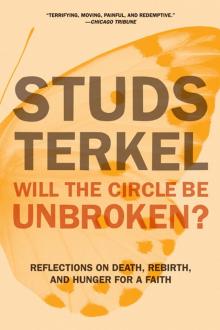 Will the Circle Be Unbroken?
Will the Circle Be Unbroken?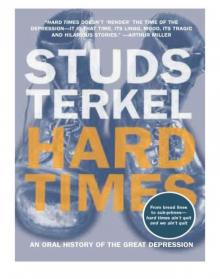 Hard Times
Hard Times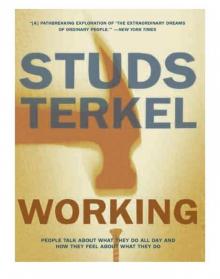 Working
Working Touch and Go
Touch and Go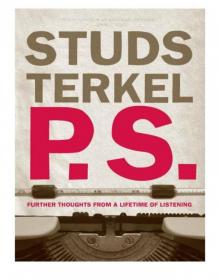 P.S.
P.S.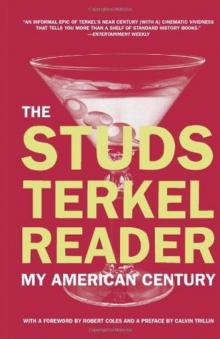 The Studs Terkel Reader_My American Century
The Studs Terkel Reader_My American Century